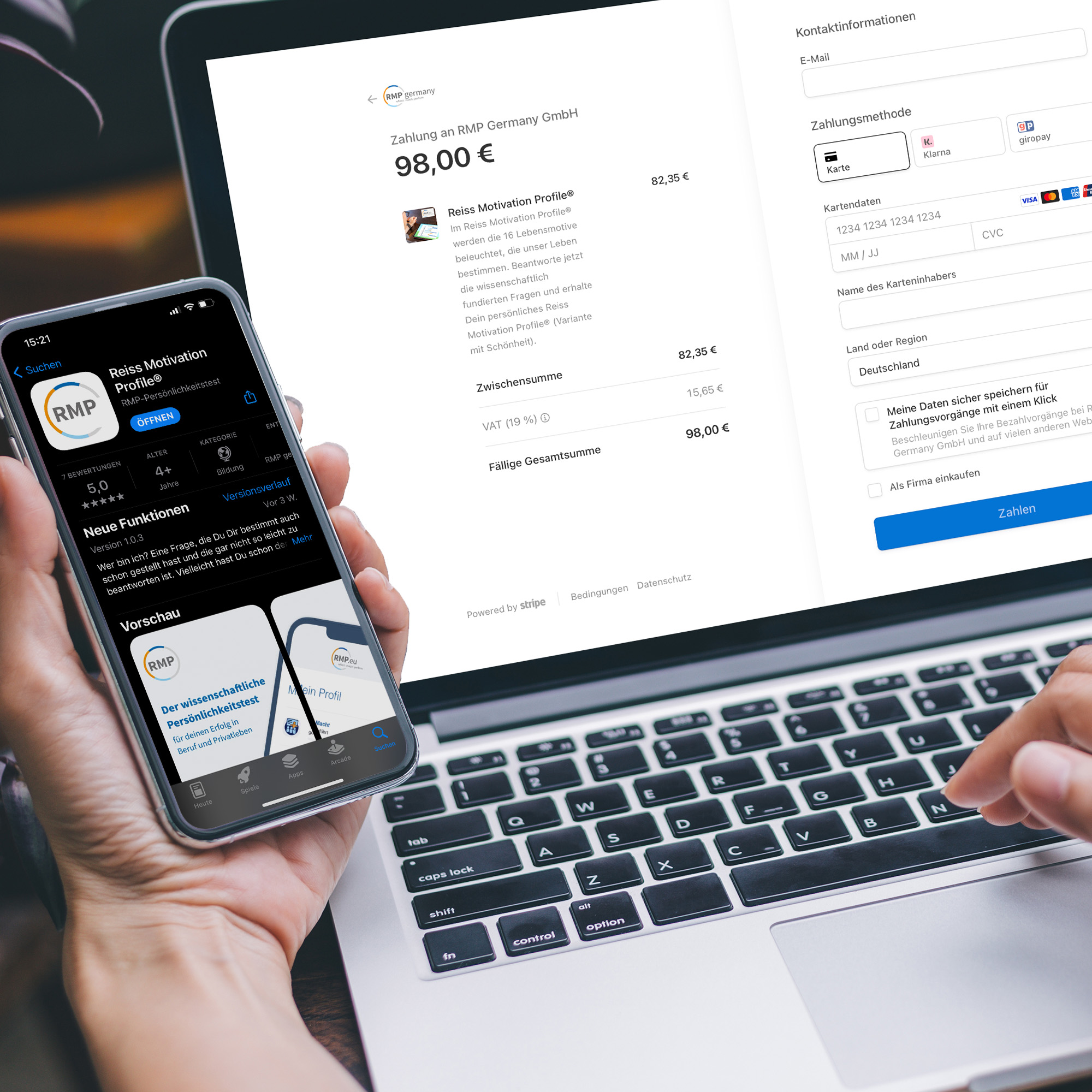
Definition: personality test, personality and character
A personality test is a (psychological) test procedure for recording dispositional personality traits. Dispositional traits are characteristics that are not directly observable, but manifest themselves in certain behavior. Personality tests are therefore instruments used in psychology to record certain characteristics and the behavior of people. If questionnaires are used, then we also speak of so-called psychometric tests - in other words, we are talking about written information rather than oral information. These can be performance tests, but also personality tests.
Personality traits that are shaped by genetics, heredity and upbringing are made visible by psychometric testing procedures. Such a test provides us with further information about ourselves, enabling us to shape our professional and private lives in harmony with it and to promote satisfaction, cooperation and coexistence in a company, team, partnership or within the family.
Where is a personality test used?
Personality tests can be used in all areas of life. Whether professionally, when it comes to planning your own career. In leadership, in the team, in recruiting or in consulting, training and coaching. Personality tests are also used in private life: including relationships, personality development, life planning and sports.
Personality tests in companies
Personality tests have become an indispensable part of today's professional world. For many companies, it is important to assess employees correctly, which is why they already rely on personality tests when shortlisting applicants. Or when it comes to giving feedback in interviews or coaching with employees. This should make it easier for them to decide whether the person is a good fit for the job, the team, and the company. More and more companies are recognizing that personality is the starting point for modern HR management. They realize that the new colleague must not only fit the job professionally, but must also fit well into the team on a human level. In this way, they also want to minimize emotional friction from the outset. The advantage is that employees are more motivated from the outset, that they do not see themselves as limited to their qualifications, but that their personality type also plays a role, and that they thus feel valued as a person. Likewise, a fit between person and job profile ultimately leads to better work performance. A professional approach is crucial for success here. An exclusively job-related personality description lacks the human aspects, which is why it is advisable to resort to a tool that can actually capture personality.
Manipulability
As good as all tests that are based on a questionnaire, tests on one's own personality can also be manipulated and the evaluation thus falsified. But at this point the question is: What is the point? In most cases, it becomes clear sooner or later that the lived reality does not match the results that come from the personality questionnaire. As a rule, this cuts into one's own flesh. If you think it's smart to manipulate the test with wrong answers in order to secure better chances of getting a job, for example, you will sooner or later realize that this is not a good idea. Therefore, absolute honesty is also required when filling out the questions. It should be noted that there is no right or wrong answer.
What are the personality tests?
There are countless different personality tests on a wide variety of topics. On closer inspection, however, it quickly becomes clear that, with a few exceptions, these are purely for entertainment purposes. They were developed to make us laugh and should therefore not be taken particularly seriously. However, there are also some tests that are based on psychological models and theories and are therefore scientifically actually able to say something about us.

Big Five
Very well known is the Big Five personality test, which can also be found under the name OCEAN model. This test procedure determines five basic dimensions that describe a person's character traits. According to the Big Five procedure, personality is composed as follows:
- Openness
- Conscientiousness
- Extraversion
- Agreeableness
- Neuroticism
The personality traits are found worldwide across all cultures. They are considered a standard model and the Big Five personality test remains one of the most commonly administered tests to this day.

Myers Briggs Test (MBTI)
In the Myers-Briggs test, too, personality is first divided into different starting points. Two expressions are always contrasted.
Introverted and Extraverted (I / E)
Intuitive and Sensory (N / S)
Feeling and Thinking (F / T)
Judging and Perceiving (J / P)
This results in a total of 16 personality types, each of which is summarized in a combination of letters. The MBTI is based on the findings of the Swiss psychologist Carl Gustav Jung and was taken up by the Americans Katherine Briggs and Isabel Briggs Myers and developed into its own test, which describes the 16 personality types.

DISG-Model
The U.S. psychologist William Moulton Marston developed the DISG model in 1928, again based on research and Carl Gustav Jung. In the 1970s, this also gave rise to John Geier's DISG test. In the DISG method, four different principles of behavior are distinguished and divided by color into red, yellow, green and blue. The interaction of these makes up the character and shows its strength as well as weakness.
Red stands for the dominant type, who makes and implements decisions quickly. He is considered determined, competitive and is usually known to make his own rules. Sometimes he is also described as aggressive and ruthless.
Yellow is the initiative type. He is considered social and likes to socialize. He also talks about his feelings, is creative and connects people. Very likes to be the center of attention and is also often described as messy to chaotic.
Green is a steady type who values routines and harmony. He is a good listener and cares about others. Change or major decisions are difficult for him.
Blue describes the conscientious type. He is very reliable, thinks things through and does not ignore any detail. He sets high standards for himself and always proceeds systematically. However, he is often perceived as a perfectionist.

The Reiss Motivation Profile® - RMP
Of the many lists of basic motives and intentions in psychology, the 16 Life Motives stand out because they are based on a broad empirical foundation and the study of thousands of individuals. Many other approaches are almost invariably based on pure introspection.
The 16 life motives were determined strictly empirically: They are based on factor analytic evaluations of seven studies with a total of 2,548 subjects and could also be confirmed cross-culturally in two follow-up studies with 512 and 522 Japanese subjects.
Specifically, the following criteria are considered here:
- four-week retest reliability: testing whether a repetition of the measurement yields the same measured values when the characteristics to be measured remain constant
- internal consistency: a scale is internally consistent if the answers to the different items of the scale fit well together and are highly correlated
- Factor validity
- Convergence validity: a form of validity from the agreement (convergence) of a measure (Reiss Motivation Profile®) with another measure (PRF scale) whose validity has already been tested.
- Criterion validity: Measurement of the agreement between the test results and one or more observable external criteria.
The original 2007 RMP norms included approximately 7,800 respondents and were based on a universal set of data standardized for both sexes and all countries and age groups. A renormalization completed in 2012 on approximately 45,000 respondents continued to support the use of a universal set of data. In 2017, a second renormalization based on about 80,000 data, found significant differences between women and men on five life motives, which subsequently led to the implementation of gender norms. Separate country norms were also developed for those countries that had sufficient data to allow statistically valid comparisons.
The current statistical analysis addressed four issues:
We reexamined the need for separate gender norms and separate country norms. We reexamined whether RMP scores vary systematically with respondent age and explored possible motivational differences across generations.
The overall descriptive analysis provided evidence that:
- Men and women continue to differ significantly in the same five previously identified life motives,
- test participants from different countries still differ in the importance of some motives
- RMP scores do not correlate with age
- the mean scores and variance for the life motives are fairly constant across all generations except for Generation Z.
The current data not only continue to support the use of separate gender and country norms, but also reconfirm that separate age norms are not necessary. In addition, the current data point to the need for separate norms for Generation Z.
Download PDF: The 2022 Renormalization of the Reiss Motivation Profile®.
©2022 IDS Publishing Corporation. All rights reserved.
Unlike many other personality tests, the Reiss Motivation Profile® captures the complete motive, drive and value structure of a person. The 16 life motives are independent dimensions that have a high explanatory value in relation to human behavior and also have a high predictability of behavior. The various life motives are combined in each person in a way peculiar to him and are more or less pronounced. Thus, the individuality of people is taken into account and no attempt is made to assign people to these typologies.
Frequently asked questions about personality testing

A personality test is a psychological testing procedure used to assess people's personality traits. They can be used in both professional and private contexts to gain a better understanding of one's personality and to make decisions in professional and private life.
There are many different types of personality tests, such as questionnaires, interviews, observations and performance tests. Each type has its own strengths and weaknesses and is suitable for certain applications. It is important to choose the right test procedure for the desired purpose.
In a professional context, the use of personality tests can help build the best team, support career planning, and improve employee satisfaction and performance. They can also help identify leadership potential and develop skills.
Like any test, personality tests also have certain disadvantages. One disadvantage may be that the results can be influenced by various factors, such as the test taker's form on the day or the test form itself. Also, test results may not reflect all facets of personality and so incorrect conclusions may be drawn from the result.
It is important to ensure that the personality test chosen is scientifically sound, validated and empirically proven, and administered by a professional and qualified provider. It is also important to consider the results of the test in conjunction with other factors such as feedback from colleagues and supervisors to gain a more comprehensive understanding of personality. It is also advisable to consult a qualified and experienced counselor or coach to interpret the results of the test and plan the best steps in terms of professional and/or personal development.
The 16 life motives of the Reiss Motivation Profile® were determined strictly empirically. You can find experienced consultants or coaches on our homepage under Master.

I've always been a pretty ambitious person. By my mid-20s, I had my MBA in the bag and was determined to conquer the world. But then, over the years, ... "Why am I doing all this?". I wondered what was to come in my life. Nothing seemed important or meaningful to me anymore. I tried everything possible to get out of this slump. Then I found motorcycling. It was the freedom I was looking for - freedom from everyday life and conventions. The insights from the Reiss Motivation Profile changed a lot for me. Since then, I'm much happier and feel like I've finally found my place in the world.

I was approaching my 50th birthday and felt like I was at a dead end. I had a good job, but I was unhappy. My children were out of the house, and I felt empty and unfulfilled. I knew I had to change something, so I decided to take the Reiss Motivation Profile Test. This is a questionnaire that helps you figure out what really motivates you. When I saw the results, I was surprised: I wanted self-determination and fulfillment. I quit my job and started looking for something new. It was difficult, but I finally found the perfect freelance job. Finally, I feel fulfilled and have found meaning in my life!

I have always dreamed of becoming a successful businessman. So, when I got the chance to start my own business, I grabbed it with both hands. I worked hard and was soon able to get some big clients for myself. It was everything I had ever dreamed of. But at some point, I realized that something was missing. Although I was successful professionally, I felt empty and unhappy inside. I realized that I no longer saw the point in what I was doing. So I went in search of something new. And finally I found it: a task that really fulfilled me and made me happy. With the answers from the Reiss Motivation Profile® I finally know again why I live - and the feeling is indescribable!

Our relationship had seen better days. We were basically not as close as we used to be and I wondered if that was what relationships do - they change and you have to come to terms with it. But then I came across the Reiss Motivation Profile. It's a test that tells you what really motivates you - and I discovered something new about myself. I realized I needed much more than just the daily routines in our partnership. I needed variety and new experiences. So I shared my findings with my partner and we decided to try something new together. And now it feels like we have rediscovered our relationship! We are closer than ever and look forward to all the exciting things to come!

I had been with my partner for over ten years, but lately it felt like I barely knew him anymore. We had grown apart and our relationship seemed to be just a memory of better times. I felt like I had tried everything to get our relationship back on track, but nothing seemed to work. The profile helped me figure out what really motivated me and what was missing in my relationship. After I took the test and discussed the results with my partner. We both understood each other better and were able to support each other better.

I recently did the Reiss Motivation Profile and it was totally eye-opening. I've always gotten along well with my partner, but now it's like we're meeting on a whole new level. We can now talk about our deepest wants and desires. By understanding our motives, our relationship has reached a whole new level. I am so grateful for this tool and I know it will help us in the future.
Buy Reiss Motivation Profile® test and Online Analysis

Step 1
Buy Reiss Motivation Profile®

Step 2
Answer scientifically based question

Step 3
Individual evaluation of your profile
After the purchase you will get access to our online dashboard. There you have to fill out the questionnaire in the first step. After answering the 128 questions, you will receive your evaluated and individual Reiss Motivation Profile® after a few minutes. In your dashboard you will get a detailed and individual evaluation of your personal Reiss Motivation Profile® and our ChatGPT-based RMP Buddy (chatbot) will help you discover and reflect on your life motives.
Buy your Reiss Motivation Profile® now
- Reiss Motivation Profile® Test (questionnaire available in DE, EN, FR, IT, DK, SV, FI, NO, PT, ES, NL, RU)
- Access to your dashboard (available in DE, EN)
- PDF report (available in DE, EN, FR, IT, DK, SV, FI, NO, PT, NL, RU)
- Individual evaluation of your profile and lifemotives (available in DE, EN)
- Recommendations that fit your life motives (available in DE, EN)
- Share profile with family and friends
Cost: 190,- Euro

We inform you about the processing of your personal data in our privacy policy and in the information sheet according to Art. 13 DSGVO. For the legally compliant processing of payment transactions, we use the service provider stripe.

